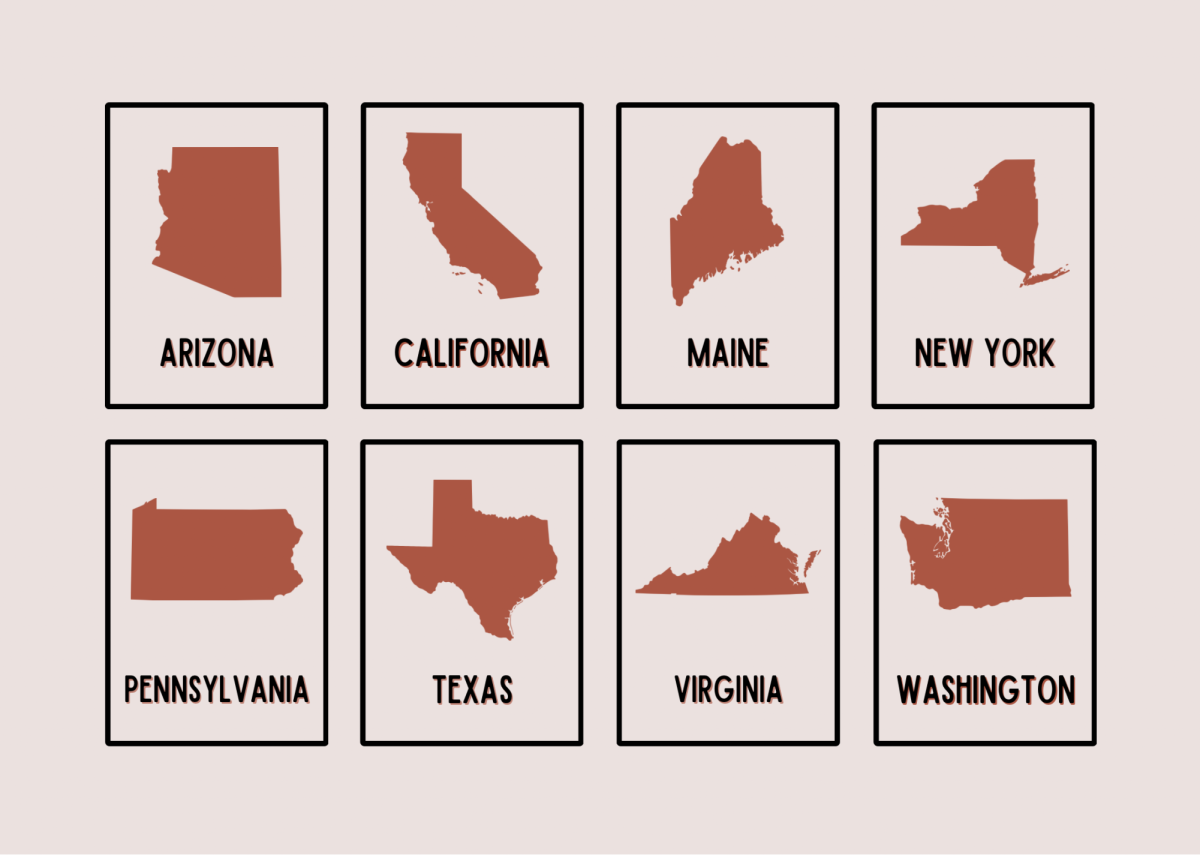Growing up on the coast of Maine is perhaps one of, if not, the best gift to have as a kid: the rocky coast and a supply of seafood that seems endless. But no matter how much he likes Maine’s magnificent coastline, Upper School Dean of Student Life Dr. Brandon Maguire has never really liked lobsters. “I don’t like lobsters that much,” he says. Born into a teacher family in the 1970s, Dr. Maguire was taught to be respectful of others. From a Franklin D. Roosevelt (FDR) Democratic family, he too aligns with the Democratic Party. “Human rights, unions and climate. My beliefs align with Democrats more,” he explained.
More than 2,000 miles away from the Maine Coastline in the Arizona Sun Corridor, Upper School Social Science teacher Mr. Chase Williams grew up in a very conservative family. For a Democratic operative like him, it is hard to imagine that he was the student volunteer of the year for the Bush 2004 campaign. “The Jack Abramoff scandal [in 2006] made me volunteer for a conservative Democrat,” Mr. Williams, citing the lobbying corruption scandal that changed his perception of the Republican Party. Recalling his time volunteering for former Democratic Rep. Harry Mitchell, “Representative Mitchell gave us really thoughtful answers,” Mr. Williams said. “Then it was Obama in 2008. He offered a different kind of politics, one that is more optimistic.”
For both Democrats, the choice in this election cannot be clearer. “For a person like me whose marriage was only possible because of a Supreme Court case,” referring to Obergefell v. Hodges, which legalized same-sex marriage in 2015, “abortion access matters,” Mr. Williams declared. Mr. Williams says that he is voting for Harris as a result. Dr. Maguire, who was a history teacher, argues that Harris will be better for cross-strait relations. “Trump would not protect Taiwan,” he claimed.
On November 5th, Americans headed to the ballot box to vote in an election filled with drama, tragedies, and misinformation. Biden dropped out and came Kamala Harris; Trump experienced two assassination attempts; and polls cannot be any closer. The race to 270 electoral votes seems like a race to the end, American today is so divided that regardless of who wins on election day, half of the country will wake up resenting the other half. As of poll closing, merely one percent of voters are undecided — the rest opting for either Trump or Harris.
Yet, for people like Ms. Christie Coniglio, the Upper School PE and sport science teacher, the choice is nuanced. Born in Erie, Pennsylvania — a city deeply influenced by its industrial roots — Ms. Coniglio developed a set of political beliefs that, for many, might be unconventional. A self-described Voluntaryist, Coach Coniglio believes in minimizing what she describes as coercive government control and maximizing individual freedom.“I was around the same age as you when 9/11 occurred, and what struck me was how quickly the government expanded its power, often at the expense of individual rights,” she recalled.
She explained how measures like the Patriot Act, which increased surveillance of American citizens, and the prolonged wars in Iraq and Afghanistan did not align with her core values of peace and non-aggression. When asked about this year’s election, she believes that for her to support any political candidate, it would require the candidate to align with her foundational principles, such as a commitment to anti-war stances and respecting individual freedoms. “No candidate is perfect, but I would need to see a shared commitment to non-aggression and individual rights before considering support.”
Another person struggling with the two choices before the American people is Upper School math teacher Mr. Edward Hillmann, an independent who traditionally leans Democratic. “A liar and a faker,” Mr. Hillmann described the two major party candidates. Although he does not like Trump nor trust him, Mr. Hillmann is uncertain about voting for Harris, who he believes is not doing enough to introduce herself and who he believes is inconsistent in terms of policies. “She’s running for president. She needs to be present and consistent.”
All these Americans came from varying backgrounds and grew up all across the US. They all left America for jobs, for love, and for a life that better suited them. Yet, even though their political identities distinguish them from one another, the truth is this: they are more similar than they are different. They all believe that America has its own flaws, but they also share a common desire for a better America regardless of how differently they believe it can be reached.
This election will be critical for the future America wants, but it is also a chance for Americans to understand one another again. It is more important for Americans to recognize the similarities that they share instead of the differences that divide them. Across America, political violence has been on the rise: the plot to kidnap the Michigan governor, the attempted homicide of the House Speaker’s husband, two assassination attempts on Trump and death threats sent to election officials across the United States.
What can America do better? Talk to one another. That’s when you realize that politics is not a hot potato. It’s not that scary, but you do have to put in the effort to engage in those dialogues. Without these discussions, Americans will only feel more different when, in reality, they are more similar than they believe they are.


![Helen Zia talks to students in the auditorium at Flex. [ANNABELLE HSU/THE BLUE&GOLD]](https://blueandgoldonline.org/wp-content/uploads/2025/09/helen-zia-1200x800.jpg)
![[PHOTOS COURTESY OF MS. VINOD]](https://blueandgoldonline.org/wp-content/uploads/2025/09/Untitled-design-1200x675.png)
![Mr. Sean Patella-Buckley [PHOTO COURTESY OF MR. PATELLA-BUCKELY], Mr. Yoonsoo Kang [PHOTO COURTESY OF MR. KANG], Ms. Mikayla Patella-Buckley [PHOTO COURTESY OF MS. PATELLA-BUCKLEY], Ms. Lien Martens [PHOTO COURTESY OF MS. MARTENS],](https://blueandgoldonline.org/wp-content/uploads/2025/09/teachers-1200x675.png)
![Sofia Valadao [Erin Wu/The Blue&Gold]
Erin Wu [Annabelle Hsu/The Blue&Gold]](https://blueandgoldonline.org/wp-content/uploads/2025/05/erin-sofia-pic.png)
![Dr. Simeondis, Mr. Anderson. [Annabelle Hsu/The Blue&Gold]](https://blueandgoldonline.org/wp-content/uploads/2025/05/teachers-1200x675.jpg)
![[PHOTO COURTESY OF UNCULTURED, JUNIPER AND CO.]](https://blueandgoldonline.org/wp-content/uploads/2025/05/student-businesses-1200x675.png)